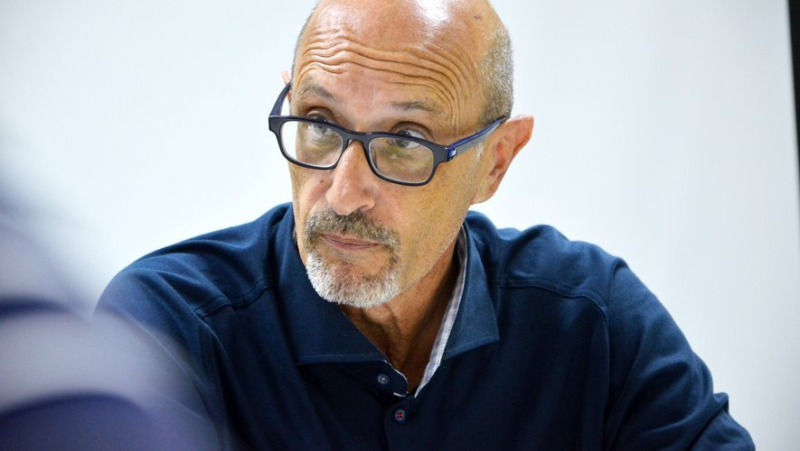How Occitanie became the champion of daily alcohol consumption: “We have long been a protected region”

Addictologist Pascal Possoz: “Alcohol is a disease of loneliness”. Midi Libre – NICOLAS ZARROUK
According to a study published this Tuesday, January 23 by Public Health France, Occitanie is the region with the most daily alcohol consumers. Welcoming new arrivals, loneliness, poverty, aging… Pascal Possoz, doctor and addictologist at the Parc clinic in Castelnau-le-Lez, deciphers the phenomenon.
Doctor at the Parc clinic, addictologist Pascal Possoz, is one of the pioneers of addiction consultations, thirty years ago.
One in ten inhabitants drinks alcohol daily in Occitanie, more than in other French regions. Why ?
Languedoc-Roussillon has long been extraordinarily protected, before the 1990s, compared to other regions such as the North or Brittany. And then we, gastroenterologists, saw the arrival in the 90s of patients with pathologies linked to excessive alcohol consumption, digestive pathologies for example, with an increase in the prevalence of these pathologies. 60% of our patients have a problem with alcohol, and 10% of the general population.
We analyzed the situation by the fact that the region is very attractive, and that it has also attracted people with different alcohol consumption.
It's not because we are a wine region, and even more so yesterday than today ?
No, not at all. Besides, the problem for winegrowers is that we no longer drink wine… and for me, daily consumption is not always problematic in terms of health. But if you drink six glasses a day, you will have to reduce your consumption, it's too much, you can have hypertension, a heart attack… like when you go on a diet. And not everyone is equal, depending on their physiology.
Wine is a "food", one of the foods of the Mediterranean diet, we have spoken of the "French paradox" in the 90s. There has long been a “know how to drink”, a learning process carried out within the family. It's over, there is no more education in taste. I tried to do it in schools, I had created an association to teach young people to drink in middle and high schools, the rectorate said “no”.
What's up with the beer ?
In the North, beer was a table alcohol, it is no longer that. We have beers that have up to 11 degrees of alcohol, these are high beers, which we pay a few euros and drink alone, or with those who are our age. We only ever drink one… we drink outside of meals, and this leads to the phenomena of massive alcoholism in one evening, “binge drinking” ;.
"Addictions are there to combat loneliness"
But the Public Health France study also shows that 18-24 year olds drink less…
Alcohol consumption begins very early, alcoholism can be a pediatric disease. And it’s true that there is a reduction in consumption in the generation after. But other types of alcohol are arriving, vodka for example.
I would say that overall people drink less, but those who drink drink more.
What are the other particularities of Occitanie, besides its attractiveness ?
The region is characterized by great precariousness and a high unemployment rate. Addictions, which are not just overconsumption, are also hobbies to combat loneliness: addiction is an existential problem. For example, there is a huge problem with alcohol use disorder among seniors, which led me to create a posture center just for these elderly people.
We focus on alcoholism among young people because it is spectacular, but practices are changing. that's true.
"Alcohol addiction is a societal phenomenon, it should not be reduced to a medical problem"
In addition to geographical particularities, these are the phenomena that Public Health France points to, the evolution of practices among young people, among women too…< /strong>
Today, I see a phenomenon that I didn't see in the 90s: a mixture of alcohol and cocaine, it's very common among people who have to ' hold" to correspond to good social representation, to be young and efficient.
Alcohol addiction is a societal problem, we must not reduce it, as we tend to do today, to a medical problem.
The problem is complex, you say, and more complex than we imagine…
I will even say that I don't know if it's a good thing that alcohol consumption is decreasing. Perhaps it is a sign of withdrawal, of a loss of conviviality.
In France, 10% of the population does not drink. And on the other hand, there are two million people with an alcohol problem, but we only treat 7% of them, even though studies show that they go to the doctor more than the general population. For 70% of them, they have good biological assessments, while we have identified 200 illnesses linked to alcohol-related illness. For example, it is involved in 20% of breast cancers. There is not an organ that escapes alcohol.
The month of alcohol-free January ends, the study shows that if the "Dry January" is known now, few people experience it…
The interest is that we are talking about the problem of alcohol-related diseases. But Dry January is not for the sick, you should also consult your doctor before starting… When you are dependent, it's dangerous. With a withdrawal phenomenon on the third day of weaning.
I subscribe to read more




